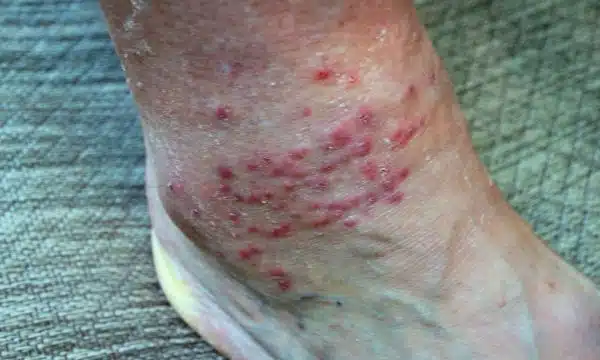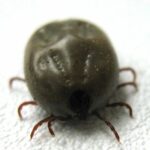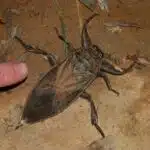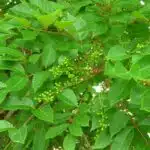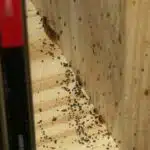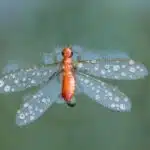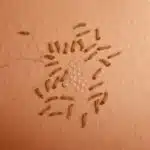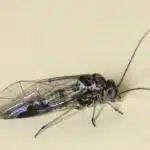Chiggers are microscopic mites that can cause a lot of discomfort when they bite. They are commonly found in grassy or wooded areas, and their bites can lead to intense itching and irritation. If you have been bitten by chiggers, it is important to know how to get rid of them on your skin or in your home.
As an entomologist or pest control expert, it is crucial to understand the biology and behavior of chiggers in order to effectively control them. In this article, we will explore the different methods for getting rid of chiggers on your skin and in your home, as well as ways to prevent future infestations. By following these tips, you can ensure that you and your loved ones are safe from the discomfort and potential health risks associated with chigger bites.
What Are Chiggers?
Chiggers are tiny red mites that belong to the arachnid family. They are also known as harvest mites, berry bugs, or red bugs. Chigger bites can cause intense itching and rashes on the skin. These pests can be found in many parts of the world, including North and South America, Asia, and Australia.
Chiggers have a complex life cycle that involves four stages: egg, larva, nymph, and adult. The larval stage is the one that causes problems for humans and animals. After hatching from eggs laid in soil or vegetation, chigger larvae seek out a host to feed on. They attach themselves to the skin of mammals, birds, reptiles or amphibians using their mouthparts.
Chiggers prefer warm and moist environments like grassy fields, forests, swamps or gardens. They are most active during the warm months of summer and early fall when temperatures range from 77-86°F (25-30°C). Chiggers tend to avoid areas with direct sunlight exposure because they dry out quickly in hot conditions. Understanding chigger habitats and behavior is key to preventing infestations in your home and yard. Let’s explore where chiggers live in more detail below.
Where Do Chiggers Live?
Chiggers are arachnids that commonly live outdoors, especially in yards and gardens. They can often be found in wooded and forested areas, as well as grass, bushes, shrubs, and weeds. Chiggers prefer moist, sandy, or soil-filled areas, and will often hide in leaf litter and decaying matter, such as mulch. Chiggers are typically found in areas with a higher temperature and humidity, and may be present in mulch, soil, and leaf litter. Chiggers can be found in any environment where they can find their favorite food sources, such as insect larvae, small mammals, and birds. It is important to remember that chiggers are more likely to be found in moist areas, and in areas with decaying matter, such as mulch, leaf litter, and soil.
Outdoors
Outdoor activities can bring enjoyment to many people. However, it’s important to be aware of the potential presence of chiggers in these areas. Chiggers are tiny mites that thrive in moist and grassy environments, where they feed on skin cells. While they don’t pose a significant threat to human health, their bites can cause intense itching and discomfort.
To minimize the risk of encountering chiggers during outdoor activities, it’s crucial to take preventative measures. Wear long pants and sleeves, tuck your pants into your socks or boots, and apply insect repellent containing DEET to exposed skin. Avoid walking through tall grass or vegetation whenever possible. After returning indoors from an outdoor activity, thoroughly inspect your clothing and body for any chiggers that may have hitched a ride.
If you do find yourself with chigger bites, there are several steps you can take to alleviate the itching and promote healing. Wash the affected area with soap and water as soon as possible after exposure. Apply an over-the-counter anti-itch cream or calamine lotion to relieve symptoms. Avoid scratching the bites, which can lead to infection. If necessary, seek medical attention for severe or persistent symptoms. By following these preventative measures and taking prompt action if bitten by chiggers, you can enjoy your outdoor activities without suffering from uncomfortable bites.
Yards
Chiggers are tiny mites that can cause discomfort to humans. While they prefer moist and grassy areas, they can also be found in yards. Yards are an ideal environment for chiggers as they provide a perfect habitat for them to thrive.
Yard maintenance is crucial in controlling the presence of chiggers. Regular trimming of the grass and vegetation can reduce their population. Eliminating any standing water sources can decrease humidity levels, which is essential for their survival. Additionally, keeping the yard free of debris and clutter can limit potential hiding spots for these mites.
In cases where preventative measures aren’t effective, pest control services may be required. Professional pest control experts have access to specialized tools and techniques that can effectively eliminate chigger populations from yards and homes. They can also provide advice on how to keep your yard pest-free in the future, ensuring that you can enjoy your outdoor activities without worrying about chigger bites.
Gardens
Chiggers are tiny mites that can cause discomfort to humans. They prefer moist and grassy areas but can also thrive in gardens. Gardens with overgrown vegetation, leaf litter, and standing water sources are ideal habitats for chiggers. As an entomologist or pest control expert, it is important to understand the factors that attract chiggers to gardens.
Certain types of plants such as ivy, ferns, and tall grasses should be avoided in gardens if one wants to prevent chigger infestations. These plants provide the perfect hiding spots for chiggers and create a humid environment that they thrive in. Best practices for maintaining a chigger-free garden include regular trimming of grass and vegetation, removing leaf litter and debris, and eliminating any standing water sources. It is essential to keep your garden dry as chiggers cannot survive in dry environments.
In conclusion, preventing chigger infestations in gardens requires proper maintenance of the garden environment. Avoidance of certain types of plants, regular trimming of vegetation, removal of debris, and elimination of standing water sources are effective ways to maintain a healthy garden that is free from chiggers. As an entomologist or pest control expert, it is crucial to educate homeowners on these best practices to ensure their outdoor activities are not interrupted by pesky chigger bites.
Identifying Chigger Bites
Identifying chigger bites is crucial for prompt treatment and prevention of more severe symptoms. Chiggers are tiny mites that feed on human skin, leaving red, itchy bumps in their wake. These bites commonly occur in areas with thin or sensitive skin, such as the ankles, waistline, and groin. The bites can be difficult to detect because chiggers are nearly invisible to the naked eye.
Common symptoms of chigger bites include intense itching and a red bump surrounded by a halo-like rash. The bite may take several hours to develop after exposure to chiggers and can last up to a week without treatment. Scratching the bite area can lead to secondary infections and potentially more severe symptoms.
Treatment options for chigger bites include over-the-counter antihistamines or topical creams containing corticosteroids. Calamine lotion or cool compresses can also provide temporary relief from itching. It is important to avoid scratching the bite area to prevent further irritation or infection.
As previously mentioned, scratching chigger bites can lead to intense itching and potential infections. In the next section, we will explore why these bites itch and provide additional tips for managing symptoms.
Why Do Chigger Bites Itch?
As an entomologist, I find it amusing how chiggers can ruin a perfectly good day out in the woods or even in your backyard. These little mites are not only annoying but also quite troublesome. They can make you itch for days on end and cause a lot of discomfort. But why do chigger bites itch? Let’s take a closer look.
Causes of chigger bites can range from walking through tall grass to sitting on a log or stump. Chiggers are tiny mites that like to attach themselves to human skin and feed on our blood cells. They use their sharp mouthparts to pierce the skin and inject saliva into the wound. This saliva contains enzymes that break down skin cells, making it easier for them to feed on the resulting slurry.
Symptoms of chigger bites include red bumps or welts that are extremely itchy, especially around areas where clothing fits tightly against the skin, such as ankles, waistbands, and armpits. The intense itching is caused by an allergic reaction to the enzymes in the chigger’s saliva. While scratching may provide temporary relief, it can also lead to infection and scarring. Treatment options for chigger bite itch include over-the-counter antihistamines, topical creams containing corticosteroids or calamine lotion, and cold compresses to alleviate swelling and pain.
With all that said about treatment options for chigger bite itch, there are also home remedies worth considering for those who prefer natural remedies. In the next section, we’ll explore some popular home remedies for chigger bites that have proven effective over time.
Home Remedies For Chigger Bites
Home remedies for chigger bites are a popular choice among those who prefer natural solutions to pest problems. These remedies can be made from ingredients commonly found in the home and may provide relief from the itching and irritation caused by chigger bites. While some home remedies may work better than others, they are generally considered safe and effective.
One of the most popular home remedies for chigger bites is to apply a mixture of baking soda and water to the affected area. This paste can help reduce itching and inflammation. Another option is to apply apple cider vinegar directly to the bite. The acidity of the vinegar may help neutralize the chigger’s saliva, which is what causes the itching.
Tea tree oil is another option for treating chigger bites at home. This essential oil has anti-inflammatory properties and can help reduce swelling and redness. To use tea tree oil, dilute it with a carrier oil, such as coconut or olive oil, and apply it directly to the bite. Be sure to test a small area first to ensure you are not allergic or sensitive to tea tree oil.
Some other possible remedies include oatmeal baths, Epsom salt soaks, and cold compresses. While these remedies have not been scientifically proven to be effective against chigger bites, they are generally considered safe and may provide temporary relief from symptoms.
Moving on from home remedies, there are also over-the-counter treatments available for those seeking additional relief from chigger bites.
Over-The-Counter Treatments For Chigger Bites
As we explored in the previous section, chigger bites can be extremely bothersome and painful for those who experience them. While home remedies are effective at reducing symptoms, there are also over-the-counter (OTC) options available that can provide relief.
OTC treatments for chigger bites include topical creams and sprays that contain ingredients such as hydrocortisone or calamine. These products work by reducing inflammation and itchiness associated with the bites. OTC treatments are generally effective and readily available at most drug stores or pharmacies. However, it’s important to note that their effectiveness may vary from person to person.
When considering cost comparison between DIY remedies and OTC options, it’s important to weigh the pros and cons of each. While DIY remedies may be less expensive, they may not always be as effective or long-lasting as OTC treatments. Additionally, some individuals may find DIY remedies to be messy or inconvenient to use. On the other hand, OTC treatments offer a more convenient and streamlined option for those seeking relief from chigger bites.
As we’ve seen, over-the-counter treatments offer a viable option for individuals suffering from chigger bites. However, in some cases prescription medications may be necessary to treat severe symptoms or prevent infection. In the next section we’ll explore these prescription options in further detail.
Prescription Medications For Chigger Bites
Prescription medications may be necessary for severe cases of chigger bites. Topical creams such as hydrocortisone or calamine lotion can help relieve itching and inflammation. These creams should be applied directly to the affected area, up to four times a day. Oral antibiotics may also be prescribed by a healthcare professional if the bite becomes infected or does not heal properly.
It is important to follow the dosage instructions provided by your healthcare professional when using prescription medications for chigger bites. Overuse or misuse of these medications can lead to adverse side effects and complications. It is also important to note that prescription medications should only be used under the guidance of a healthcare professional and should not be shared with others.
In addition to prescription medications, there are several home remedies that can help alleviate symptoms of chigger bites. These include taking an oatmeal bath, applying a cold compress, and avoiding scratching the affected area. However, if symptoms persist or worsen, it is recommended to seek medical attention from a healthcare professional.
- Itching and discomfort from chigger bites can cause significant distress and impact daily activities.
- Prescription medications can provide relief for severe cases of chigger bites.
- Proper use and guidance from a healthcare professional are crucial when using prescription medication for chigger bites.
Moving forward, preventing chigger bites outdoors requires proper protective measures.
Preventing Chigger Bites Outdoors
- To prevent chigger bites outdoors, it is important to wear protective clothing such as long-sleeved shirts, long pants, and socks.
- Additionally, it is important to avoid tall grass, as this is a common habitat for chiggers.
- When spending time outdoors, it is also a good idea to check for chiggers on clothing and skin to prevent bites.
- Applying insect repellent to clothing or skin can also help to prevent chigger bites.
- After spending time outdoors, it is important to take a shower and wash all clothing to remove any chiggers that may have been picked up.
- Finally, it is important to inspect and clean any outdoor gear before bringing it back indoors to prevent chiggers from entering the home.
Wear Protective Clothing
Wearing protective clothing is one of the most effective ways to prevent chigger bites while spending time outdoors. Clothing that covers as much skin as possible, such as long pants and sleeves, can help reduce the amount of exposed skin for chiggers to latch onto. When choosing clothing items, it is important to opt for loose-fitting garments that do not cling tightly to the skin.
In addition to covering up with clothing, applying insect repellent can also provide an extra layer of protection against chigger bites. Repellents containing DEET or picaridin have been found to be effective in deterring chiggers from biting. However, it is important to follow the instructions on the label and apply only a thin layer onto exposed skin.
It is important to note that while wearing protective clothing and using insect repellent can reduce the risk of chigger bites, it may not eliminate it entirely. It is still recommended to avoid areas with high vegetation and brush if possible and check your body thoroughly for any signs of chiggers after outdoor activities. By taking these precautions, individuals can greatly reduce their chances of encountering pesky chiggers in their outdoor adventures.
Avoid Tall Grass
A crucial step in preventing chigger bites while spending time outdoors is to avoid tall grass and brushy areas. Chiggers are commonly found in these types of environments, particularly in warm and humid conditions. When exploring outside, it is best to stay on well-maintained paths or open areas to reduce the risk of encountering chiggers.
One way to minimize the presence of chiggers in outdoor spaces is by regularly mowing lawns and trimming vegetation. This can help create a less hospitable environment for chiggers to thrive, as they tend to prefer higher grasses and overgrown areas. By keeping yards and outdoor spaces well-groomed, individuals can lower their chances of coming into contact with these pesky insects.
It is important to note that even when staying on cleared paths and avoiding tall grass, wearing protective clothing and using insect repellent is still recommended. These precautions can provide an extra layer of defense against chigger bites while enjoying the outdoors. By taking these measures, individuals can enjoy their time outside without worrying about being plagued by itchy, annoying chigger bites.
Check For Chiggers
Preventing chigger bites outdoors is crucial for anyone who enjoys spending time in nature. In addition to avoiding tall grass and brushy areas, checking for chiggers can be an effective way to reduce the risk of being bitten. Chiggers are tiny arachnids that can cause intense itching and discomfort when they attach themselves to the skin.
Identifying symptoms of chigger bites is important for prompt treatment. Symptoms usually appear several hours after exposure and include red, raised bumps that may resemble hives or blisters. These bumps are typically located in areas where clothing fits tightly against the skin, such as around the waistband or under socks. Effective removal methods include taking a hot shower or bath immediately after exposure and washing clothes in hot water with detergent.
While it may not be possible to completely eliminate the risk of encountering chiggers while enjoying outdoor activities, taking preventative measures such as checking for chiggers can significantly reduce the likelihood of being bitten. By staying aware of symptoms and using effective removal methods, individuals can minimize the impact of these pesky insects on their outdoor adventures.
Tips For Keeping Chiggers Out Of Your Home
As we discussed in the previous section, preventing chigger bites outdoors is essential to avoid bringing them inside. However, if you do find yourself with chiggers on your skin inside or around your home, there are some steps you can take to get rid of them. But first, let’s talk about DIY chigger barriers that can prevent them from entering your home.
One way to keep chiggers out of your yard is by creating a barrier. This can be done by placing a layer of gravel or wood chips around the perimeter of your property. This will make it difficult for chiggers to cross and enter your home. Additionally, you can plant chigger-resistant landscaping such as lavender, marigold, or eucalyptus around the border of your yard.
If you suspect that there are chiggers in your home, it is important to act quickly. Start by thoroughly cleaning any areas where you spend time, such as bedrooms and living rooms. Vacuum carpets and furniture and wash bedding and clothing in hot water. It is also a good idea to inspect any pets for signs of chiggers as they may have carried them inside. By taking these steps and implementing DIY barriers outside, you can successfully get rid of chiggers in and around your home.
Moving forward, let’s talk about how to check for chiggers in your home to ensure they don’t return.
How To Check For Chiggers In Your Home
Checklist for Finding Chiggers in Your Home:
Chiggers are tiny pests that can be difficult to spot with the naked eye. However, they can cause itchy and painful bites on your skin. If you suspect that you have chiggers in your home, there are a few things you can do to check for them. First, inspect any areas of your home where there is tall grass or vegetation, as these are common places where chiggers like to hide. Look for small red or orange mites that move quickly on the ground or on plants.
Secondly, check any pets that spend time outdoors and may have brought chiggers inside with them. Use a fine-tooth comb to brush through their fur and look for any small red or orange mites. Finally, check yourself and anyone else who has been spending time outdoors in areas where chiggers are known to be present. Pay close attention to areas of the body where clothing is tight-fitting, such as around the waistband or under bra straps.
Prevention Tips for Keeping Chiggers Out of Your Home:
Preventing chiggers from entering your home is key to avoiding their bites and discomfort. Some prevention tips include wearing long-sleeved shirts and pants when working outdoors in areas with tall grass or vegetation. You may also want to use insect repellent containing DEET on exposed skin. Additionally, try to keep your lawn trimmed short and remove any piles of leaves or debris where chiggers may hide.
Another effective prevention method is to shower immediately after spending time outdoors in areas where chiggers may be present. Use soap and warm water to wash away any remaining chigger larvae before they have a chance to attach themselves to your skin. By following these simple prevention tips, you can reduce the chances of encountering these pesky pests in your home.
Transition: While prevention is key when it comes to keeping chiggers out of your home, sometimes they still manage to find their way inside. In the next section, we will discuss some natural ways to repel chiggers and keep them away from your skin.
Natural Ways To Repel Chiggers
As the saying goes, prevention is better than cure. If you live in an area with chiggers, it’s best to take measures to prevent them from coming into your home. One way to do this is by using a DIY chigger repellent made from essential oils. Some essential oils that are effective in repelling chiggers include tea tree oil, lavender oil, and eucalyptus oil. Simply mix a few drops of these oils with water and spray around your home.
In addition to using natural repellents, it’s also important to keep your home clean and tidy. Chiggers are attracted to clutter and debris, so make sure to regularly sweep and vacuum your floors. You should also wash any bedding or clothing that may have come into contact with chiggers. Hot water and high heat will kill any chiggers that may be hiding in your clothes.
If you already have chiggers in your home, there are chemical treatments available that can help eliminate them. However, it’s important to use these treatments carefully as they can be harmful if not used properly. Some common chemical treatments for chiggers include insecticides and acaricides. These products should only be used according to their instructions and should never be ingested or applied directly to the skin.
Transitioning into the subsequent section about chemical treatments for chiggers in your home, it’s important to note that while these treatments can be effective in eliminating chiggers, they should always be used as a last resort after trying natural methods first. It’s also important to consult with a pest control expert before using any chemical treatments as they can provide guidance on how to use them safely and effectively.
Chemical Treatments For Chiggers In Your Home
Chemical treatments can be an effective way to get rid of chiggers in your home. There are various types of chemical sprays and repellents available in the market, specifically designed for eliminating these tiny pests. Before using any chemical treatment, it is essential to read the instructions carefully and follow them precisely to ensure your safety and prevent any damage to your property.
DIY chigger control methods may not always be successful, especially when dealing with a severe infestation. In such cases, it is best to seek professional help from pest control experts. They have the necessary knowledge and experience to identify the root cause of the problem and use appropriate chemicals that are safe for humans but lethal for chiggers.
Using chemical sprays and repellents may provide temporary relief from chiggers in your home, but they are not a long-term solution. If you notice a persistent problem, it is best to call a pest control professional who can assess the situation and provide a more permanent solution. In the next section, we will discuss when it’s time to call a pest control professional and what you can expect from their services.
When To Call A Pest Control Professional
While DIY prevention measures can often be effective in dealing with chigger infestations, there are certain situations where it may be necessary to call a pest control professional. One such situation is when the infestation is severe and widespread, making it difficult for homeowners to adequately address on their own. In these cases, a professional can provide more powerful and targeted treatments that will eliminate the problem more quickly and effectively.
Another reason to consider calling in a pest control professional is if you have tried several different DIY methods without success. While there are many effective home remedies for preventing and treating chigger bites, some infestations may require specialized knowledge or equipment that only a professional can provide. Additionally, a pest control expert can help identify any underlying issues that may be contributing to the infestation, such as overgrown vegetation or standing water.
Ultimately, the decision of whether or not to call in a pest control professional will depend on the severity and duration of your chigger infestation, as well as your own personal comfort level with handling insects and pesticides. If you do decide to bring in outside help, be sure to choose a reputable company with experience in dealing with chiggers specifically. By working together with professionals and taking proactive steps towards prevention, you can successfully eliminate chiggers from your home and enjoy greater peace of mind knowing that your family is protected from this annoying pest.
Transition: Now that we have discussed when it may be necessary to call in professional help for dealing with chiggers, let’s take a closer look at why proper chigger control is so important for maintaining good health and wellbeing.
The Importance Of Proper Chigger Control
After learning about the potential dangers of chiggers and their impact on humans, it is clear that proper control measures must be taken to prevent further infestations. The importance of controlling chiggers cannot be overstated, as they can cause severe itching, pain, and even disease transmission. Proper control measures involve a combination of preventive methods and treatment options that target these pests directly.
One effective way to control chiggers is by removing their natural habitats. This includes keeping grass trimmed short, removing brush piles or debris from your yard, and reducing moisture levels around your home. Additionally, using insecticides that contain permethrin or other active ingredients can help kill off any remaining chiggers in the area. It is important to follow label instructions carefully when using these products, as improper use can lead to health risks for both humans and pets.
Overall, taking steps towards proper chigger control is crucial for maintaining a safe living environment free from pest infestations. By implementing preventative measures such as removing potential habitats and using insecticides when necessary, homeowners can effectively reduce the likelihood of future outbreaks. Remember to always consult with a pest control professional if you are unsure about how best to proceed with chigger control in your home or surroundings.
Conclusion And Final Thoughts
As we wrap up our discussion on how to get rid of chiggers on skin in or around home, it is important to stress the significance of prevention. Chiggers are not only a nuisance but can also transmit diseases such as scrub typhus. Therefore, taking preventive measures such as wearing long-sleeved clothing, applying insect repellent containing DEET, and avoiding areas with high vegetation can go a long way in keeping chiggers at bay.
Long term chigger control involves reducing their habitat. This means mowing lawns regularly, clearing brush piles and tall grasses, and keeping outdoor areas clean. It is also important to keep pets away from infested areas as they can carry chiggers into your home. If you suspect an infestation in your home or yard, contacting a professional pest control service is advised.
In conclusion, chiggers can cause discomfort and pose health risks if left unchecked. Taking preventive measures and practicing long-term chigger control are crucial steps in ensuring the safety and well-being of yourself and your loved ones. Remember that prevention is key when dealing with these pesky pests!
Conclusion
Chiggers are a type of mite that can cause intense itching and discomfort when they bite. Understanding where chiggers live and how to identify their bites is crucial in preventing infestations in your home. Home remedies such as hot showers, oatmeal baths, and calamine lotion can provide relief from chigger bites. Chemical treatments like insecticides and sprays may also be effective in eliminating chiggers from your home.
However, it is important to note that proper chigger control requires more than just treating the symptoms. It involves identifying the root cause of the infestation and taking steps to prevent future outbreaks. This may include removing excess vegetation, sealing cracks and crevices in your home, and calling a pest control professional for assistance.
Just like any other pest infestation, ignoring the problem will only make it worse over time. Taking action now to eliminate chiggers from your home will not only provide temporary relief but also ensure long-term protection for you and your family. Remember, prevention is key when it comes to controlling pests in or around your home.
Image Credits
- “Chiggers” by Eric.Ray (featured)

